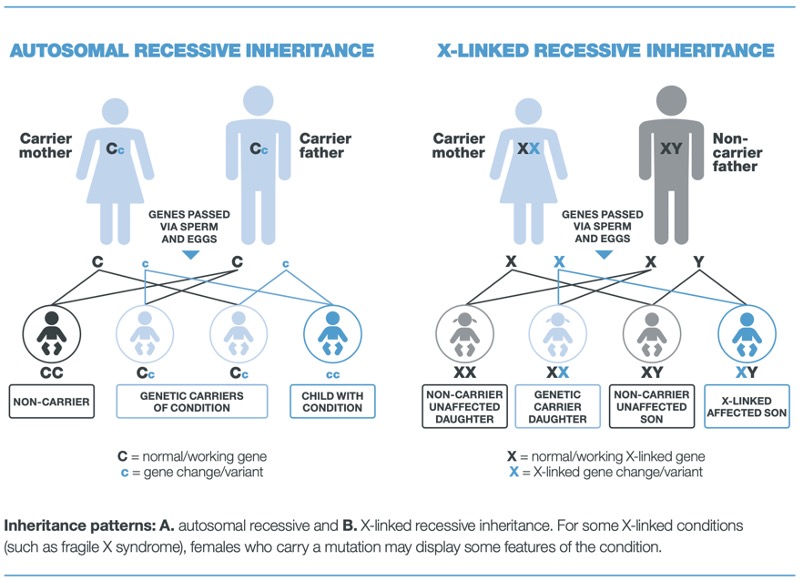In the same way that physical traits, such as blue eyes or blonde hair, are passed down from parent to child, so too are some medical conditions. Children may inherit a rare disease, even if their parents are both healthy and have no family history of the condition.
Genetic carrier screening enables you to understand your risk of passing on a particular condition to your children and to then make reproductive choices in line with your personal wishes and values. To understand what’s involved in this type of testing and whether it’s the right choice for you and your partner, please take the time to read through the following information.
What is genetic carrier screening?
Carrier screening is used to determine whether a healthy individual or couple are carriers for certain rare hereditary diseases, such as cystic fibrosis (CF), fragile X syndrome (FXS) and spinal muscular atrophy (SMA). It involves a simple mouth swab or blood test, and allows a woman or couple to understand their risk of passing an inherited condition on to their children. The Royal Australian and New Zealand College of Obstetricians and Gynaecologists (RANZCOG) now recommends that genetic carrier screening be offered to all women planning a pregnancy or in the first trimester of pregnancy.1
What does it mean to be a carrier of a disease?
A carrier is someone that does not show any symptoms of a condition, despite having a copy of the faulty gene known to cause that condition. In isolation, this gene does not cause a problem. It is only when this faulty gene is passed on to an unborn child that an issue may arise. Conditions are generally passed on in one of two ways:
Autosomal recessive inheritance
The child has the condition because it has inherited two copies of the same faulty gene – one passed on from it’s mother, the other passed on from it’s father, i.e. both parents carry the faulty gene.2 When both parents are carriers, there is a one in four (25%) chance of having an affected child with each pregnancy.
X-linked recessive inheritance
These conditions occur when the faulty gene is located on the X chromosome.2 Because males inherit only one X chromosome (from their mother), they only need to inherit one faulty gene in order to have the condition.3 Females, on the other hand, inherit two X chromosomes, one from each parent. In order to be affected, they need to inherit two faulty genes – one from their mother and one from their father. As such, women are much more likely to be carriers of these types of conditions and have a one in two (50%) chance of passing on the faulty gene with each pregnancy.

What carrier screening tests are available?
If you and/or your partner opt to undergo carrier screening, you can choose to be tested for just one condition, a few conditions, or hundreds of conditions. The most appropriate option for you will depend on your family history and ethnic background, as well as your personal wishes and values.
Single-condition screening
Single-condition, or ‘targeted’ screening, is designed to identify specific changes in one particular gene. These tests are generally offered to women and couples with a known family history of a particular condition, or from a particular ethnic background that is known to be at higher risk of inheriting a particular condition, e.g. Tay-Sachs disease which is seen at higher rates in Jewish communities, and cystic fibrosis which is more common in people with Celtic origins.4
Three-condition screening
One of the most widely used genetic tests performed in Australia, this screening panel detects faulty genes linked to three of the most common and severe inherited disorders – cystic fibrosis (CF), fragile X syndrome (FXS) and spinal muscular atrophy (SMA).4
Victorian Clinical Genetics Services (VCGS) offers a highly sensitive, three-condition screening panel called prepairTM. I generally recommend this test for women and couples who are planning or are in early pregnancy, irrespective of ethnic background or family history.
Expanded carrier screening
Expanded carrier screening enables women and couples to be screened for hundreds of rare hereditary diseases at once. It is recommended for individuals (of any ethnicity) who want to explore their level of risk beyond the three-condition screen.4
The list of genes tested for varies significantly between providers, but usually include conditions that significantly impact quality of life. For example, VCGS offers expanded carrier screening for more than 250 severe inherited disorders.5
Do both partners need to be screened?
To better determine the risk of having a child with an X-linked or autosomal recessive condition, both partners should be screened. This may be done sequentially or simultaneously.
With sequential screening, the female partner is screened first (to detect X-linked conditions). The male partner then only undergoes testing if the woman is found to be a carrier for an autosomal recessive condition.1 I often recommend sequential screening for couples who have opted for single- or three-condition screening and plan to undergo testing prior to pregnancy.
Simultaneous screening involves testing both partners at the same time. Couples are given a combined ‘high probability’ result if both partners are carriers for the same autosomal recessive disorder, or the woman is a carrier for an X-linked disorder. Simultaneous screening is usually recommended if the couple is undergoing screening during the first trimester (when the time window for receiving results and making decisions is limited), or if the couple has opted for expanded screening due to the relatively high risk of each person being a carrier for at least one condition.
If I am identified as a carrier, what are my options?
Several options are available to women and couples who are identified as carriers. When carrier status is determined before pregnancy, women and couples have access to the full range of options. They may choose to continue on to a natural pregnancy with or without prenatal diagnostic tests to check whether the fetus has the condition. Alternatively, they may choose to undergo in vitro fertilisation (IVF) with preimplantation genetic testing (PGT) to detect affected embryos prior to transfer. They may also choose to adopt or not have children.
Unfortunately, reproductive choices are more limited for women and couples who are identified as carriers during the first trimester of pregnancy. However, in this case, they do still have the option to undergo prenatal diagnostic tests (via amniocentesis or chorionic villus sampling) to check whether the fetus has the condition. This may lead them to consider termination of the pregnancy for medical reasons or to prepare themselves for having a child with a known medical condition.
Genetic counselling
Genetic counsellors and clinical geneticists are health professionals who are specially trained to counsel women and couples who are considering or have had carrier screening.
Before screening, genetic counselling allows women and couples the opportunity to have a more detailed discussion about the different screening options available and the medical conditions that can be tested for. Genetic counsellors can also provide further information about the benefits, limitations (e.g. accuracy) and implications of each type of screening.
If, following screening, one or both partners have been identified as carriers, genetic counselling ensures the couple fully understands their reproductive options and can access the support they need when making decisions. Since carrier status can impact not only the individuals but also their families, genetic counsellors also provide advice on ways to communicate results with family members.
Additional information
Please be advised that neither Medicare nor private health insurers currently offer rebates for genetic carrier screening, and out of pocket costs do vary between tests and providers. In general, single-condition screening costs around $100–$200, three-condition screening $350–$400 and expanded carrier screening $580–$900.
It’s also important to note that genetic carrier screening is not the same as other prenatal genetic tests routinely offered to pregnant women. Non-invasive prenatal testing (NIPT) and combined first trimester screening (CFTS) are still both recommended in addition to carrier screening, as these tests screen for chromosomal disorders, such as Down syndrome (which are different to genetic conditions).4,5
Is genetic carrier screening right for me?
Ultimately, only you and your partner can decide if carrier screening is right for you. These tests can raise complex ethical and moral dilemmas for a couple and will not be the right choice for everyone.
If you’re planning a pregnancy or are in the first trimester and would like additional advice and information about genetic carrier screening, you can make an appointment with me by calling (03) 9418 8299 or by booking online.
References
- The Royal Australian and New Zealand College of Obstetricians and Gynaecologists. Genetic carrier screening. East Melbourne, Vic: RANZCOG, 2019 [Accessed 14 August 2020]. ↩︎
- The Royal Australian and New Zealand College of Obstetricians and Gynaecologists. Reproductive Carrier Screening. East Melbourne, Vic: RANZCOG, 2019 [Accessed 14 August 2020]. ↩︎
- Genetics Home Reference. What are the different ways in which a genetic condition can be inherited? Maryland, USA: NIH, 2020 [Accessed 17 August 2020]. ↩︎
- The Royal Australian College of General Practitioners. Beware the rare: Carrier screening. East Melbourne, Vic: RACGP, 2020 [Accessed 14 August 2020]. ↩︎
- Victorian Clinical Genetics Services. Expanded carrier screening. Parkville, Vic: VCGS, date unknown [Accessed 14 August 2020]. ↩︎
Disclaimer
The information on this page is general in nature. All medical and surgical procedures have potential benefits and risks. Consult a healthcare professional for medical advice specific to you.
OMFG!

